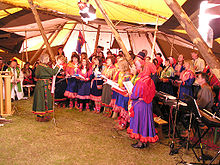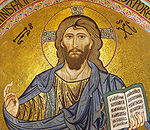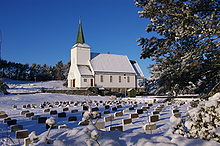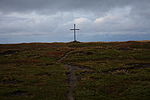- Christianity in Norway
-
The conversion of Norway to Christianity began in 1000 AD. Prior to the conversion Norwegians practised Norse paganism.

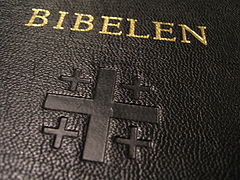 The Norwegian Bible, Bibelen.
The Norwegian Bible, Bibelen.
Christianity is the largest religion in Norway. Norway has historically been called a Christian country, but according to the most recent Eurobarometer Poll 2005,[1] only 32% of the Norwegian population say they believe there is a God. A majority of the population are members of the Church of Norway. Many Norwegians are secular; while 70% of the population say they have a faith, only 32% practice their respective faith. One need not go further back than the beginning of the 1900s to find a much more religious atmosphere. At numerous times in history, Norway sent more missionaries per capita than any other country. This changed considerably from the 1960s. Today, only 12% of the population attend church services each month.[2] Citizens born in Norway to one or two Norwegian parents are automatically added to the list of Protestant Christians in Norway, and are required to "sign out" of the church. There are two categories kept in the church's books, "medlemmer" (members) and "tilhørige" (belonging to [the State church]). Members technically have to be baptised, whereas "tilhørige" are to be taken out of the books if not baptised by the age of 18. Norwegian citizens' tax funds are given to the Protestant Church until one registers as a member of another religious group, or as a member of the Humanist association.[3]
In 1993, there were 4,981 churches and chapels in Norway.[4]
Christianization
See also: Christianization of Scandinavia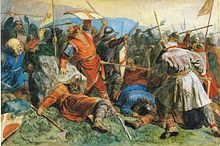 From the Battle of Stiklestad.
From the Battle of Stiklestad.
The conversion of Norway to Christianity began in 1000 AD. The raids on the British Isles and the Frankish kingdoms had brought the Vikings in touch with Christianity. Haakon the Good of Norway who had grown up in England tried to introduce Christianity in the tenth century, but had met resistance from pagan leaders and soon abandoned the idea.
Anglo-Saxon missionaries from England and Germany engaged in converting Norwegians to Christianity, but with only limited success. However, they succeeded in converting Olaf I of Norway to Christianity. Olaf II of Norway (later Saint Olaf) had more success in his efforts to convert the population, and he is credited with Christianising Norway.
The Christians in Norway often established churches or other holy sites at places that had previously been sacred under the Norse religion. The spread of conversion can be measured by burial sites as Pagans were buried with grave goods while Christians weren't. Christianity had become well established in Norway by the middle of the 11th century and had become dominant by the middle of the 12th century. Stave churches were built of wood without the use of nails in the 13th century.
By county
County Christians[5][6]  Nord-Trøndelag
Nord-Trøndelag91.2%  Sogn og Fjordane
Sogn og Fjordane90.4%  Møre og Romsdal
Møre og Romsdal90.2%  Nordland
Nordland89.9%  Oppland
Oppland89.6%  Finnmark
Finnmark89.2%  Hedmark
Hedmark89.1%  Troms
Troms88.8%  Aust-Agder
Aust-Agder87.5%  Hordaland
Hordaland87.3%  Sør-Trøndelag
Sør-Trøndelag86.7%  Telemark
Telemark86.6%  Vest-Agder
Vest-Agder85.6%  Rogaland
Rogaland85.4%  Vestfold
Vestfold84.8%  Østfold
Østfold84.6%  Norway
Norway84.2%  Buskerud
Buskerud83.0%  Akershus
Akershus81.4%  Oslo
Oslo65.8% Compared with other countries
Church attendance
Norway has one of the lowest church attendance in the world. Below is a table that compares Norway with other countries in a regularly church attendance. In contrast to 250,000 in whole Norway, 43,500 attend just one church in the United States every week (Lakewood Church) and 23,000 attend just one church in Australia (Hillsong Church).
The U.S state of Alabama has a population around the same size as Norway's population, but church attendance in Alabama is as high as 11 times higher than in Norway.
Country Regularly church attendance (%) Regularly church attendance (number)  Alabama
Alabama58%[7] 2,700,000  Poland
Poland56.7%[8] 21,600,000  Texas
Texas49%[7] 12,140,000  United States average
United States average42%[7] 120,000,000  California
California32%[7] 11,830,000  Canada
Canada25% 7,800,000  Vermont
Vermont24%[7] 140,000  France
France15% 9,800,000  United Kingdom
United Kingdom10%[9] 6,000,000  Australia
Australia7.5%[10] 1,500,000  Norway
Norway5%[11] 250,000 Importance of religion
Below is a table that compares Norway with other countries in importance of religion.
Country People who say religion is important[12] Percent Christian of total population (%)  Congo DR
Congo DR98.5% 95.1%  Philippines
Philippines95.5% 92.4%  Brazil
Brazil86.5% 90.4%  Iran
Iran82.5% 2.0%  Cyprus
Cyprus75% 98.1%  Greece
Greece71.5% 98.0%  Ireland
Ireland53.5% 92.3%  South Korea
South Korea42.5% 34.6%  Albania
Albania32.5% 20.0%  Finland
Finland28% 82.2%  Norway
Norway20.5% 85.6%  Denmark
Denmark18% 89.4%  Sweden
Sweden16.5% 79.9%  Estonia
Estonia16% 27.8% Public opinion
World Values Survey[13]
Religious Affiliation/Identification 1982 1990 1996 2005 Percent belonging to a religious denomination 95.9% 90.2% 90.7% -- Percent identifying as a religious person 48% 47.5% 46.9% 41.3% Percent raised religious -- 45.7% 41.4% -- Religious Behaviors 1982 1990 1996 2005 Percent attending religious services at least once a month 15.4% 12.7% 12.5% 10.8% Percent that meditate or pray 61.6% 64.4% -- 33.2% Percent active in a church or religious organization -- -- 8.3% 8.3% Religious Beliefs 1982 1990 1996 2005 Percent believing in God 75.5% 65% 68.8% -- Percent believing in heaven 51.9% 43.8% 46.7% -- Percent believing in hell 23.5% 19.2% 19.7% -- Percent believing in life after death 50.7% 44.7% 47.3% -- Percent believing that there are clear guidelines on good and evil 31.4% 31.6% 29.1% -- Percent believing that politicians who do not believe in God are unfit for public office -- -- -- 3.8% Percent believing that religious leaders should not influence people's vote -- -- -- 8.9% Percent believing that things would be better if there are more people with strong religious beliefs -- -- -- 6.2% Percent believing church gives answers to people's spiritual needs 64.3% 55% -- 48.2% Percent believing church gives answers on family life problems 36.5% 29.1% -- 16.1% Percent believing churches give answers to moral problems 47.5% 40.9% -- 28.7% Percent believing churches give answers to social problems -- 18.5% -- 11.7% Percent believing that religious leaders should influence the government -- -- -- 79.4% Percent believing that people have a soul 59% 54.4% 59.6% -- Percent believing in the concept of sin 59.2% 44.2% 45.4% -- Percent believing religious services are important for deaths -- 81.1% -- -- Percent believing religious services are important for births -- 66.3% -- -- Percent believing religious services are important for marriages -- 70.4% -- -- Percent believing in a personal God 39.2% 29.8% -- -- Percent believing in re-incarnation 38.4% 15.2% -- -- Percent believing in the devil's existence 30.2% 24% 28% -- Percent that think that religious faith is an important quality in children -- -- -- 8.6% Percent that agree: We depend too much on science and not enough on faith -- -- -- 25.8% Percent that do not trust people of other religions -- -- -- 20.4% Percent that often think about meaning and purpose of life -- -- -- 20.2% Religious Experiences 1982 1990 1996 2005 Percent finding comfort and strength from religion 48.5% 35.6% 39.5% -- Attitudes 1982 1990 1996 2005 Percent considering religion important -- 40.3% 38.2% 32.8% Percent considering that God is not at all important in their life 19.6% 24.8% 22.1% 27.9% Percent confident in religious organizations 49.6% 44.6% 53.5% 50.5% Other
Born again Christian[14] 1997 2010 Percent who report Born-again Christian 19% 26% People who report Born-again Christian 835,000 1,263,000 Denominations
Statistics Norway
Religion Members Percent As of 2010[15] Christianity 4,093,358 84.2% Lutheranism 3,919,571 80.6% Catholicism 66,972 1.3% Pentecostalism 39,923 0.8% Jehovah's Witnesses 11,640 0.2% Methodism 11,082 0.2% Baptism 9,749 0.2% Orthodoxy 8,492 0.1% Brunstad Christian Church 6,879 0.1% Seventh-day Adventist Church 5,136 0.1% Other Christianity 20,793 0.4% Total 4,858,199 100.0% The Association of Religion Data Archives
Denomination Percent[16] Christian 92.0% Agnostic 3.5% Muslim 2.8% Buddhist 0.7% Atheist 0.6% Baha'i 0.1% Neo-pagan 0.1% Operation World 2001
Denomination Percent[17] Christianity 93.7% Protestant 89.4% Other Christian 2.0% Independent 1.2% Roman Catholic 0.8% Non-religious 5.0% Islam 1.0% Buddhism 0.2% Christianity by Country
North AmericaSouth AmericaOceaniaProtestantism
Lutheranism
Church of Norway
Main article: Church of NorwayThe Church of Norway (Den norske kirke in Bokmål or Den norske kyrkja in Nynorsk) is the state church of Norway. The church confesses the Lutheran Christian faith. It has as its foundation the Christian Bible, the Apostles' Creed, Nicene Creed, Athanasian Creed, Luther's Small Catechism and the Augsburg Confession. The Church is a member of the Porvoo Communion with 12 other churches, among them the Anglican Churches of Europe. It has also signed some other ecumenical texts, including the Joint Declaration on the Doctrine of Justification with the Roman Catholic Church.
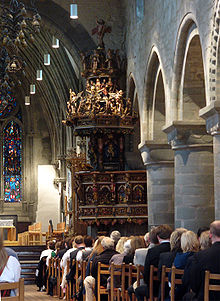 A liturgy in Stavanger Cathedral.
A liturgy in Stavanger Cathedral.
The constitutional head of the Church is the King of Norway, who is obliged to profess the Lutheran faith. The Church of Norway is subject to legislation, including its budgets, passed by the Norwegian parliament, the Storting, and its central administrative functions are carried out by the Royal Ministry of Culture and Church Affairs.
The Church has a congregational and episcopal structure, with 1,284 parishes, 106 deaneries and 11 dioceses, namely:
- Oslo, seated in Oslo, also covers Asker and Bærum (Bishop Ole Christian Kvarme)
- Borg, seated in Fredrikstad covering areas southeast of Oslo (Bishop Helga Haugland Byfuglien)
- Hamar, seated in Hamar covering most of the inland areas north and east of Oslo (Bishop Solveig Fiske)
- Tunsberg, seated in Tønsberg covering coastal areas just southwest of Oslo and inland northwest (Bishop Laila Riksaasen Dahl)
- Agder og Telemark, seated in Kristiansand covering Southeastern Norway (Bishop Olav Skjevesland)
- Stavanger, seated in Stavanger covering Southwestern Norway (Bishop Erling Pettersen)
- Bjørgvin, seated in Bergen covering parts of Western Norway (Bishop Halvor Nordhaug)
- Møre, seated in Molde covering northern parts of Western Norway (Bishop Ingeborg Midttømme)
- Nidaros, seated in Trondheim, covering Trøndelag (Bishop Tor Singsaas)
- Sør-Hålogaland, seated in Bodø, covering southern areas of Northern Norway (Bishop Tor Berger Jørgensen)
- Nord-Hålogaland, seated in Tromsø, covering the rest of Northern Norway (Bishop Per Oskar Kjølaas)
As of 2008[18] Percent Members 3,874,823 81.8% Participation in worship services, Sundays and holidays 5,069,341 Baptism 42,599 Confirmation 41,655 Consecration 10,536 Funeral 38,832 Evangelical Lutheran Free Church of Norway
The Evangelical Lutheran Free Church of Norway (Den Evangelisk Lutherske frikyrkja i Noreg in Norwegian) or the Free Church as it is commonly known, is a nationwide Lutheran church in Norway consisting of 81 congregations with 19,262 members in 2009[19]. It was founded in 1877 in Moss. It should not be confused with the Church of Norway, though both churches are members of the Lutheran World Federation. The Free Church is economically independent.
The following numbers is from :[19]
The Swedish Margareta Congregation in Oslo
15,574 members in 2009, up from 7,267 in 2005.
The Methodist Church of Norway
10,974 members in 2009, down from 11,981 in 2005.
Det norske misjonsforbund
8,497 members in 2009, down from 8,505 in 2005.
The Christian Community
6,779 members in 2009, up from 6,054 in 2005.
The Finnish Evangelical Lutheran Congregation
4,237 members in 2009, up from 3,504 in 2005.
Free Evangelical Congregations
3,434 members in 2009, down from 3,653 in 2005.
Christian Centres
3,290 members in 2009, up from 3,264 in 2005.
The Evangelical Lutheran Church Community
3,232 members in 2009, down from 3,410 in 2005.
The Icelandic Evangelical Lutheran Congregation in Norway
2,735 members in 2009, down from 3,395 in 2005.
The Christian Community
2,474 members in 2009, up from 2,472 in 2006.
Pentecostalism
Main article: Pentecostalism in NorwayBaptism
Main article: Baptism in NorwayBrunstad Christian Church
Main article: Brunstad Christian ChurchBrunstad Christian Church is the largest international Christian movement founded in Norway.[citation needed]
Adventism
Main article: Adventism in NorwayAnglicanism
Main article: Anglicanism in NorwayRoman Catholicism
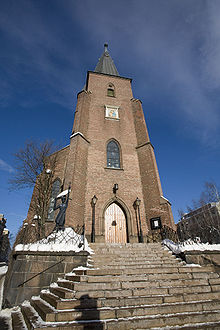 St. Olav Catholic church in Oslo.
St. Olav Catholic church in Oslo. Main article: Roman Catholicism in Norway
Main article: Roman Catholicism in NorwayThe Catholic Church in Norway is part of the worldwide Catholic Church, under the spiritual leadership of the Pope and the Curia in Rome. There are about 57,000 - 230,000 Catholics in the country, 70% of whom were born abroad[20]. The country is divided into three Church districts – the Diocese of Oslo and the prelatures of Trondheim and Tromsø and 32 parishes. The Bishop of Oslo participates in the Scandinavian Bishops Conference. The Catholic Church in Norway is as old as the kingdom itself, dating from approximately 900 A.D., with the first Christian monarchs, Haakon I from 934.
At first, the bulk of Roman Catholic immigrants came from Germany, The Netherlands, and France. Immigration from Chile, the Philippines, and from a wide range of other countries began in the 1970s. This development has further increased in the last few years with economic immigrants from Poland and Lithuania. The official number of Catholics, however, decreased slightly in 2004.[citation needed] This is because the Norwegian state demands a person's social security number (fødsels-og personnummer) in order to grant the per capita subsidy. The real number of Roman Catholics in Norway is possibly as much as twice the official number of 50,000.[citation needed] Ethnic Norwegian Catholics are now greatly outnumbered by the immigrants, although the former tend to be far more observant and conservative, being a self-selected group largely of ex-Lutheran converts.
Orthodoxy
Main article: Orthodoxy in NorwayRestorationism
Jehovah's Witnesses
Jehovah's Witnesses is the largest nontrinitarian religious organization in Norway, with a membership of 14,976 in 2009.[21] A branch office is located in Ytre Enebakk. Jehovah's Witnesses receive public grants in the same manner as other registered religious communities in Norway.
Mormonism
Main article: Mormonism in NorwaySee also
- Religion in Norway
- List of Norwegian Christians
References
- ^ "Eurobarometer on Social Values, Science and technology 2005 - page 9" (PDF). http://ec.europa.eu/public_opinion/archives/ebs/ebs_225_report_en.pdf. Retrieved 2007-05-05.
- ^ Norsk samfunnsvitenskapelig datatjeneste - Få nordmenn i kirken, men ikke færre enn før
- ^ [1]
- ^ Hvor mange aktive kristne finnes i Norge?
- ^ Statistics Norway - Church of Norway.
- ^ Statistics Norway - Members of religious and life stance communities outside the Church of Norway, by religion/life stance. County. 2006-2010
- ^ a b c d e "San Diego Times, May 2, 2006, from 2006 Gallup survey". http://www.signonsandiego.com/uniontrib/20060502/news_lz1n2thelist.html.
- ^ "Polish lead EU in Sunday church attendance". http://www.catholicnewsagency.com/news/polish_lead_eu_in_sunday_church_attendance/.
- ^ "'One in 10' attends church weekly [2] publisher = BBC News".
- ^ [3] NCLS releases latest estimates of church attendance], National Church Life Survey, Media release,
- ^ NorgeIDAG - Hvor mange aktive kristne finnes i Norge?
- ^ GALLUP WorldView - data accessed on 17 january 2009
- ^ The Association of Religion Data Archives
- ^ Sterk økning i personlige kristne
- ^ Statistics Norway - Church of Norway and other religious and philosophical communities
- ^ The Association of Religion Data Archives
- ^ Joshua Project - Religions
- ^ Kirkedatabasen
- ^ a b Statistics Norway
- ^ Vårt land - 200 000 katolikker i Norge
- ^ Statistics Norway
External links
- Statistics Norway - 430 000 members in religious and life stance communities
- Store Norske Leksikon - Norwegian
Bahá'í Faith · Buddhism · Christianity (Protestant Churches (Adventist Church · Anglican Church · Baptist Church · Lutheran Churches (Church of Norway · Evangelical Lutheran Free Church of Norway) · Pentecostal Church, Roman Catholic Church, Orthodox Church, Nontrinitarian Church, Restorationist Church, Mormon Church) · Hinduism · Islam · JudaismCategories:
Wikimedia Foundation. 2010.


